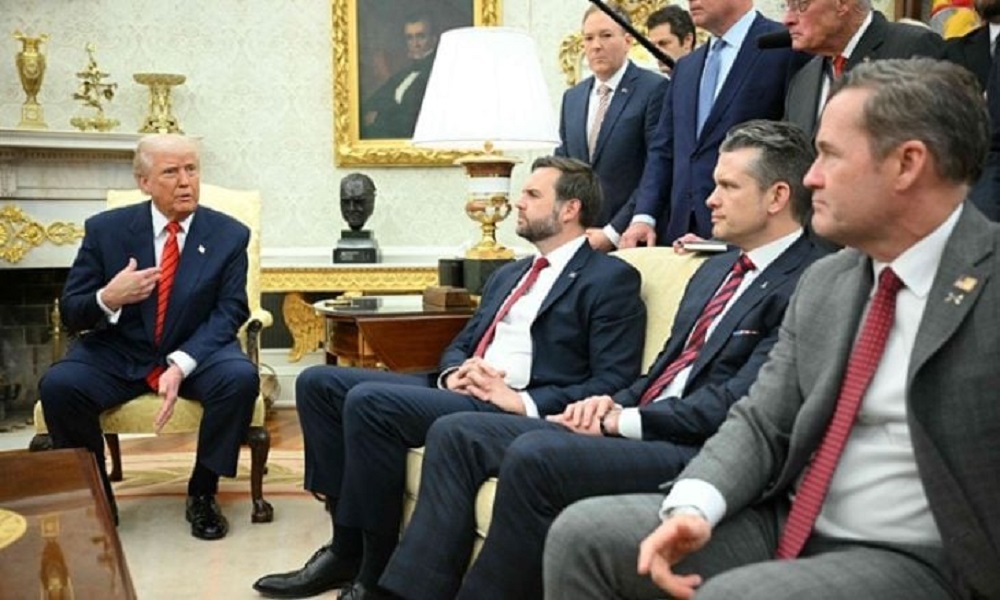Leaked Yemen War Plans Expose Trump Administration’s Security Failures and Contempt for Europe
Signal app blunder reveals internal chaos, hostility toward allies, and alarming disregard for civilian casualties

Watan-A newspaper published an editorial stating that the leaking of U.S. war plans regarding Yemen via the Signal app to a journalist reveals major dysfunction in Donald Trump’s administration.
It added that the leak—or fiasco—points to broad shortcomings, indifference, and a lack of experience within the U.S. administration.
What’s striking is that senior officials in the Trump administration mistakenly leaked war plans to a journalist. But the core issue is that 18 prominent officials were comfortable discussing highly sensitive material through a private messaging app, which highlights the administration’s unusual negligence, recklessness, and lack of accountability.
More importantly, the conversations revealed a deep-rooted, instinctive hostility toward Europe—especially from Vice President J.D. Vance—and a disregard for the human cost of U.S. airstrikes on civilians in Yemen. These strikes are aimed at preventing Houthi attacks on commercial ships in the Red Sea. According to the Houthi-run Ministry of Health, 53 people were killed, including five children and two women.

Signal Slip Exposes Trump Team’s Recklessness
National Security Advisor Mike Waltz responded to the attacks by posting a fist emoji, an American flag, and fire emojis. The article notes that the absence of remorse for the security breach is also telling. This breach—whether isolated or collective—is far more significant than what Trump called a “glitch”; it is a hallmark of his administration.
Apparently, Waltz was the one who organized the chatter on Signal and accidentally included The Atlantic magazine’s editor-in-chief, Jeffrey Goldberg. According to the magazine, Defense Secretary Pete Hegseth shared details about the timing, sequence, specific targets, and weapons used in the attacks, although the administration denies that classified intelligence was shared.
Other group members included Vance, Director of National Intelligence Tulsi Gabbard, CIA Director John Ratcliffe, special envoy to the Middle East Steve Witkoff, and “MAR”—the initials of Secretary of State Marco Rubio.
The article notes that the lack of remorse for the security breach is significant, emphasizing that this breach is far more serious than what Trump dismissed as a glitch—it is emblematic of his administration.
Typically, conversations between administration officials are conducted with strict secrecy, especially on matters like this. Although Signal is an encrypted app, there remains a risk of infiltration—something that would delight foreign intelligence agencies.
Legal experts consider holding such discussions and leaking plans in this way a potential violation of the Espionage Act.

From Email Attacks to Signal Silence
The article points out the blatant hypocrisy: during the 2016 election campaign, several members of the Signal group attacked Hillary Clinton—Trump’s opponent—for using a private email server to receive official messages, including some that were classified but not highly sensitive. They also criticized her for automatically deleting emails. Messages on Signal will likewise disappear, despite federal records laws requiring the preservation of such communications.
This leak, in many ways, confirms what U.S. allies already knew—including the administration’s contempt for Europe. In the conversation, Europe was expected to bear the cost of the American strikes. Vance described the operation, aimed at protecting maritime trade and containing Iran, as “saving Europe again.” Hegseth responded: “I completely share your hatred of European freeloading.”
The article concludes that concerns over Trump and his administration’s handling of classified information are not new. During his first term, reports revealed that he had disclosed highly sensitive intelligence from an ally to the Russian foreign minister. After leaving office, Trump faced dozens of charges over alleged mishandling of classified documents—charges that were later entirely dismissed by a judge he had appointed.
The article notes that Britain and other countries cannot ignore the situation—especially given their reliance and entanglement with U.S. intelligence. Their role now is to manage the risks and prepare for the worst. The breach may not be significant because of its content, but because of the exposure and global awareness it triggered.






